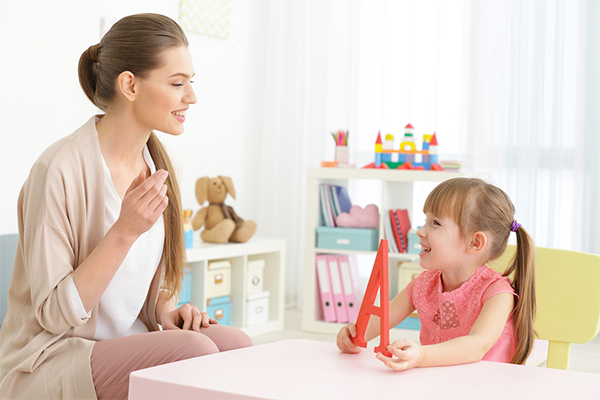As new parents, we wait breathlessly for those first words. But…what if we’re still waiting?
“To me, communication is a beautiful thing,” said Natalie Thurber, a pediatric speech-language pathologist at the Children’s Hospital of Georgia. “Understandably, parents get stressed out when kids can’t communicate.”
When Kids Should Be Communicating, Age by Age
If you think about it, children really start communicating at birth. “There are those cooing sounds, then also different cries when they’re hungry or wet,” said Thurber. “Then you start getting smiles and other responses. That’s what you’re going to see from birth up to around three to four months.”
At six months and up: “That’s when you start having consonants come in,” said Thurber. Children start making sounds like “bah” or “dah” and, of course, the long-awaited “dada” or “mama.” “
While they haven’t quite necessarily associated that when they say mama, it means mom, or that dada means dad, “it’s fun to hear baby make those sound combinations,” said Thurber.
At one year: “Babies start combining more of those sounds into simple one-syllable words,” said Thurber, like “hey” or “ball” or “dog.” Children also now understand what these words mean.
From age one to two: “Children are now putting two words together, saying ‘more apple’ or ‘big ball,’” said Thurber. “They’re combining words together and also building their vocabulary.”
At age two and up: Children continue to combine more words and may start speaking in short sentences. Full sentences really start at about ages three to four.
If Communication Isn’t Happening
Age 1 is a big marker, said Thurber. During your child’s well check, your pediatrician will ask about how many words your child can say. “If you’re not starting to see consonants and some words, there are different things you can do at home, little environmental changes,” she said, such as making sure to read to your child daily, narrating your child’s day, and more (see Start Talking, below).
At 18 months, if there still aren’t many words, your pediatrician can provide a referral for speech therapy. (At this age, children are old enough to be able to participate in therapy.) “They definitely should also have hearing tested to make sure there’s nothing going on,” said Thurber.
During the speech therapy evaluation, parents should be prepared to answer questions about any medical diagnoses that could affect speech, like autism or a cleft palate, along with questions about how the child communicates at home.
Next, the therapist may ask you to play with your child so that he or she can observe how your child communicates. Depending on how old your child is, the speech language pathologist may also do a more formal assessment to see how well your child talks and how well he or she understands speech.
Start Talking
“When your child isn’t talking, it is stressful,” said Thurber. “But even making very small changes can just mean the world and have the biggest improvement. It doesn’t have to be this advanced huge thing that you do.”
From birth on, this is one of the most important things: Just talk to your child. “Especially when they’re babies, be your child’s own personal narrator,” said Thurber.
For example, if your child is playing with a toy, say, “You have a car, the car is red, the car is fast.” “Just bombard them with words,” said Thurber.
At the same time, keep the sentences simple so they are easy for your child to imitate. So, don’t say: “Look at that green ball? Isn’t it fun? See how it’s bouncing up and down and all around?” Instead, say: “You’re playing with a green ball. It bounces, hop, hop hop.”
Then, as they repeat the words, give them that positive reinforcement. “Say, ‘Good job,’ but then also expand on what they’re saying,” said Thurber. “Say, ‘That’s right, the car. The big red car, it goes vroom, vroom, vroom,’ to not only praise, but also give that added bonus of encouraging other words.”
Research also shows that reading books to your child every day is huge in helping them develop language, helping them understand speech and helping them learn how to talk. “Children exposed to books at an early age have such a better prognosis in meeting communication milestones on time or earlier,” said Thurber.
As a full-time working mom, Thurber understands that daily reading can seem hard. “But even if it’s just once a day, say part of the nighttime routine or every morning after breakfast, it’s giving your child such a benefit as far as language development.”
For children 18 months and older who are struggling with speaking, parents can also plan on a more structured time, like 30 minutes every day, to work on expanding words. For example, a parent and child can read a book together and work on having the child name all the animals or repeat names of animals. And even if your child is visiting a speech language pathologist, it’s really important to practice what he or she learns during clinic visits at home.
It’s also really important to remember this: “Don’t compare; just because your child isn’t doing what another little boy or little girl is doing, that’s OK,” said Thurber. “Each child has his or her own unique path. There’s always potential for growth and progress.”




